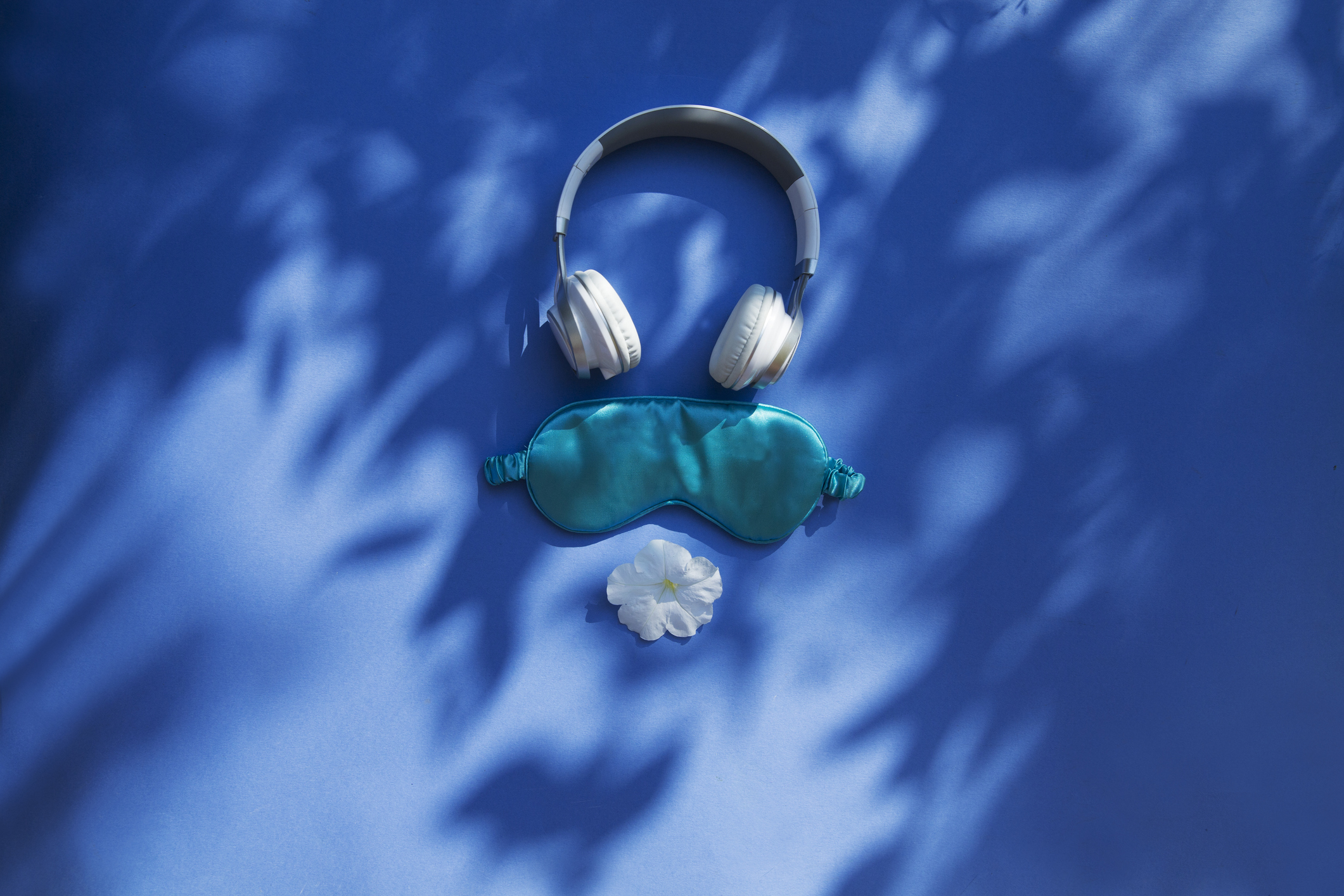Sleep
July 16, 2025
Can Music Help You Sleep Better?
When chosen wisely, music can gently nudge the brain into a more restful state, helping you fall asleep faster and sleep more deeply.
Soft rhythms may slow the heart. Gentle melodies ease mental tension. And when nighttime thoughts won’t stop racing, calming music can may act like a sound-based sedative, lowering stress hormones and signaling the nervous system to relax.
Clinical studies have shown that listening to relaxing music before bed improves sleep quality, shortens the time it takes to fall asleep, and even reduces symptoms of depression in some people. The right music can shift your body from fight-or-flight mode into rest-and-recover mode. All without a pill.
But not all music is sleep-friendly. And for some, music may do little unless it’s part of a larger routine. Still, for many people struggling with poor sleep, music is one of the most accessible, low-risk tools available and when it works, it works surprisingly well.
What Does the Research Say About Music and Sleep?
Several well-designed studies have shown that music improves sleep quality, particularly in people who struggle to fall or stay asleep.
- In a randomized trial of 94 students aged 19 to 28 with sleep complaints, those who listened to 45 minutes of relaxing classical music each night for three weeks had significantly better sleep than those who listened to audiobooks or received no intervention. Results were measured using the Pittsburgh Sleep Quality Index (PSQI), and the improvements were statistically significant (p < 0.0001).
- Interestingly, depressive symptoms also decreased in the music group, suggesting that music's calming effect isn’t limited to sleep alone but may extend to mood regulation as well (1).
Another 2019 study on 27 women found that music before a 90-minute nap not only improved subjective sleep quality but also increased objective sleep parameters, such as slow-wave sleep (the most restorative sleep stage). Participants had less light sleep (stage N1) and a better low/high frequency power ratio, an indicator of parasympathetic (rest-and-digest) nervous system dominance.
But the effects weren’t universal. In that same study, benefits were stronger among participants with a low “suggestibility index”, a psychological trait related to how open a person is to external influence. This means some people respond more deeply to music, while others may need additional techniques to see results (2).
What Type of Music Is Best for Better Sleep?
The kind of music you play matters. Upbeat or emotionally intense songs can stimulate the brain and interfere with the sleep process. The most beneficial music for sleep tends to be:
- Slow tempo: Around 60 to 80 beats per minute, close to the resting heart rate.
- Low-frequency tones: Deep, soft sounds that mirror the body’s own rhythms.
- No lyrics or gentle vocals: Lyrics can activate the language centers of the brain, which keeps you mentally engaged.
- Predictable structure: Repetitive melodies help the brain ease into a pattern and relax.
Genres that often meet these criteria:
- Classical (e.g., Bach, Debussy, Brahms)
- Ambient and instrumental tracks
- Nature sounds with soft harmonic backgrounds
- Lo-fi or slow jazz without lyrics
Some apps and streaming platforms even offer playlists engineered using biometric data, which means the music has been designed to align with your sleep cycles.
Can Music Reduce Insomnia Symptoms?
Particularly for people with mild to moderate insomnia. Some studies show music can be used alongside cognitive behavioral therapy for insomnia (CBT-I) (3).
- Music works by calming the autonomic nervous system. This system controls unconscious functions like heart rate and respiration. Music can lower sympathetic activity (which keeps you alert) and boost parasympathetic activity (which promotes rest).
- It may also help with sleep latency, or the time it takes to fall asleep (4). Many people with insomnia report falling asleep faster when music is added to their bedtime routine.
- For chronic insomnia, music may help improve sleep continuity and reduce nighttime awakenings. While it’s not a replacement for medical treatment, it’s a powerful, accessible addition.
What About Music Therapy? Is That Different?
Music therapy is a structured clinical approach delivered by certified music therapists. It involves more than just listening, sessions may include guided imagery, songwriting, or rhythmic breathing with music.
- Music therapy has been shown to help patients with chronic pain, anxiety, PTSD, depression, and sleep disorders (5, 6).
- It may also be tailored to neurological or psychological conditions. For example, patients with dementia may respond to rhythm and familiar melodies, improving their sleep-wake cycles (7).
Music listening can be effective on its own, but music therapy adds personalization, clinical oversight, and goal-oriented outcomes.
Who Benefits the Most from Bedtime Music?
Anyone can benefit, but research shows stronger effects in:
- Young adults and students with stress-related sleep problems
- Older adults who experience fragmented sleep or early awakening
- People with depression or anxiety, where ruminating thoughts delay sleep
- Patients with chronic illness, pain, or cancer-related fatigue
- Those with mild insomnia looking for a non-drug sleep aid
However, personal preference is important. Familiar, emotionally safe music tends to be more effective than unfamiliar tracks, even if the unfamiliar ones are technically more “relaxing.”
Are There Downsides to Using Music for Sleep?
Some people may actually find it distracting, especially if the music has lyrics or fluctuating volume levels. Music that’s too engaging can activate the brain’s attention centers, delaying sleep instead of encouraging it.
One overlooked issue is headphones or earbuds in bed. Sleeping with these devices increases the risk of ear canal irritation, wax buildup, or pressure-related discomfort. Over-ear headphones can cause pain with prolonged side sleeping.
Apps or playlists that auto-loop through the night may interrupt sleep if there’s a sudden song change, ad insertion, or device light activation. In short, poor setup can sabotage the benefit.

How Long Should You Listen Before Bed?
Listening to soft, soothing music for 45 minutes at bedtime has been shown to significantly improve sleep quality in older adults. In a randomized controlled trial involving adults aged 60 to 83, participants who listened to sedative music nightly for three weeks reported longer sleep duration, shorter time to fall asleep, fewer awakenings, and less daytime fatigue.
The study used six music options, including Western and Chinese selections, all designed to be calming and low in stimulation. The music sessions were played right before bed, not earlier in the evening, which helped participants ease into a sleep-friendly state at the right time (8).
Importantly, sleep improvements were cumulative. Each week of music use led to progressively better outcomes. That suggests consistency matters more than volume or complexity.
To get similar benefits:
- Choose calming, non-stimulating tracks you enjoy (instrumental is best)
- Stick to 45 minutes per night, ideally as the last activity before sleep
- Avoid multitasking. Focus only on relaxing and listening
- Play the music at low volume, around 40–60 dB (quiet conversation level)
- Use a sleep timer so it fades out naturally as you fall asleep
This approach works not just because of the music, but because it trains the brain to associate those sounds with winding down. Over time, it can create a powerful cue for sleep.
What If Music Doesn’t Help You Sleep Better?
It doesn’t work for everyone. And that’s okay.
If you try music for several nights and your sleep doesn’t improve, or worsens, it may mean:
- You’re selecting the wrong type of music (tempo too fast, lyrics too distracting)
- You’re dealing with an undiagnosed sleep disorder that needs medical care
- Your brain simply doesn’t respond well to auditory cues for sleep
Music helps many, but not all. Try alternate non-drug strategies like cognitive behavioral therapy for insomnia (CBT-I), white noise, guided breathing exercises, or progressive muscle relaxation.
Want Better Sleep? Start with the Right Assessment
If your sleep still feels broken, music might not be enough. It’s time to rule out the most common culprits: insomnia and obstructive sleep apnea (OSA).
These two conditions affect millions and often go undiagnosed:
- Insomnia makes it hard to fall or stay asleep, even when you're tired
- OSA causes repeated breathing interruptions during sleep, which can lead to snoring, gasping, and morning fatigue
Both are treatable, but only if identified. Nightly’s free online sleep assessment helps screen for signs of insomnia and sleep apnea, so you can stop guessing and start understanding what your body really needs.
References
- László Harmat, Takács, J., & Róbert Bódizs. (2008). Music improves sleep quality in students. Journal of Advanced Nursing, 62(3), 327–335. https://doi.org/10.1111/j.1365-2648.2008.04602.x
- Cordi, M. J., Ackermann, S., & Rasch, B. (2019). Effects of Relaxing Music on Healthy Sleep. Scientific Reports, 9(1). https://doi.org/10.1038/s41598-019-45608-y
- Jespersen, K. V., Otto, M., Kringelbach, M., Van Someren, E., & Vuust, P. (2019). A randomized controlled trial of bedtime music for insomnia disorder. Journal of Sleep Research, 28(4), e12817. https://doi.org/10.1111/jsr.12817
- Cayley, W. E., & James, J. (2023). Insomnia Therapy: Listening to Music. American Family Physician, 107(5), 463–464. https://www.aafp.org/pubs/afp/issues/2023/0500/cochrane-insomnia-therapy.html
- Chiedu Eseadi, & Ngwu, M. O. (2023). Significance of music therapy in treating depression and anxiety disorders among people with cancer. World Journal of Clinical Oncology, 14(2), 69–80. https://doi.org/10.5306/wjco.v14.i2.69
- Landis-Shack, N., Heinz, A. J., & Bonn-Miller, M. O. (2017). Music therapy for posttraumatic stress in adults: A theoretical review. Psychomusicology Music Mind and Brain, 27(4), 334–342. https://doi.org/10.1037/pmu0000192
- Sharma, A., Moon, E., Kim, G., & Kang, S.-U. (2022). Perspectives of Circadian-Based Music Therapy for the Pathogenesis and Symptomatic Treatment of Neurodegenerative Disorders. Frontiers in Integrative Neuroscience, 15. https://doi.org/10.3389/fnint.2021.769142
- Lai, H., & Good, M. (2005). Music improves sleep quality in older adults. Journal of Advanced Nursing, 49(3), 234–244. https://doi.org/10.1111/j.1365-2648.2004.03281.x

